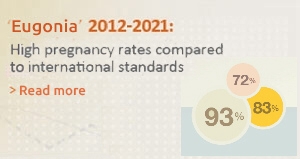AMH is a dimeric glycoprotein and a member of the transforming growth factor β (TGF-β) family. In men, it is produced by the Sertoli cells of the testes and its main action is in the regression of the Müllerian duct in male fetuses during sexual differentiation (8th-10th week of their embryonic life).
In women, AMH is produced by small follicles (<6 mm) in the ovaries. AMH production is gradually reduced as the follicle grows in diameter and it is practically non-traceable in follicles >8 mm.
A large number of studies suggest that AMH greatly reflects the total number of follicles that remain in the ovaries, i.e. it is a powerful indicator of ovarian reserve and a prognostic factor of ovarian response in an assisted reproduction treatment cycle to follow. Researchers also support that AMH measurement is equally reliable to the ultrasound assessment of the number of small antral follicles in the ovaries, which is the principal prognostic factor of ovarian reserve. AMH levels are reduced as the age of the woman increases and as the ovarian reserve decreases, while at the same time there is a simultaneous reduction in the number of developing follicles visible on ultrasound. On the contrary, in cases of a large number of follicles, as with women with polycystic ovaries, AMH levels are excessively increased.
It has also been suggested that the AMH blood levels are a predictive factor for the chances of success in an assisted reproduction treatment cycle to follow, although opinions on this do vary.
The normal values of AMH may vary and they depend of the method and the laboratory that the measurement took place. According to scientific literature and our experience, AMH values are classified as follows:
| AMH Value | Interpretetion |
| > 3.0 ng/ml | High levels (usually in polycystic ovaries) |
| > 1.0 ng/ml | Normal |
| 0.7 - 0.9 ng/ml | Lower normal range |
| 0.3 - 0.6 ng/ml | Low levels |
| < 0.3 ng/ml | Very low levels |
At Eugonia, in line with new scientific developments, we use the AMH measurement in combination with ultrasound assessment of the ovaries (number of small antral follicles and ovarian volume) and FSH and E2 levels, in order to determine ovarian reserve and select the optimal stimulation protocol.






























